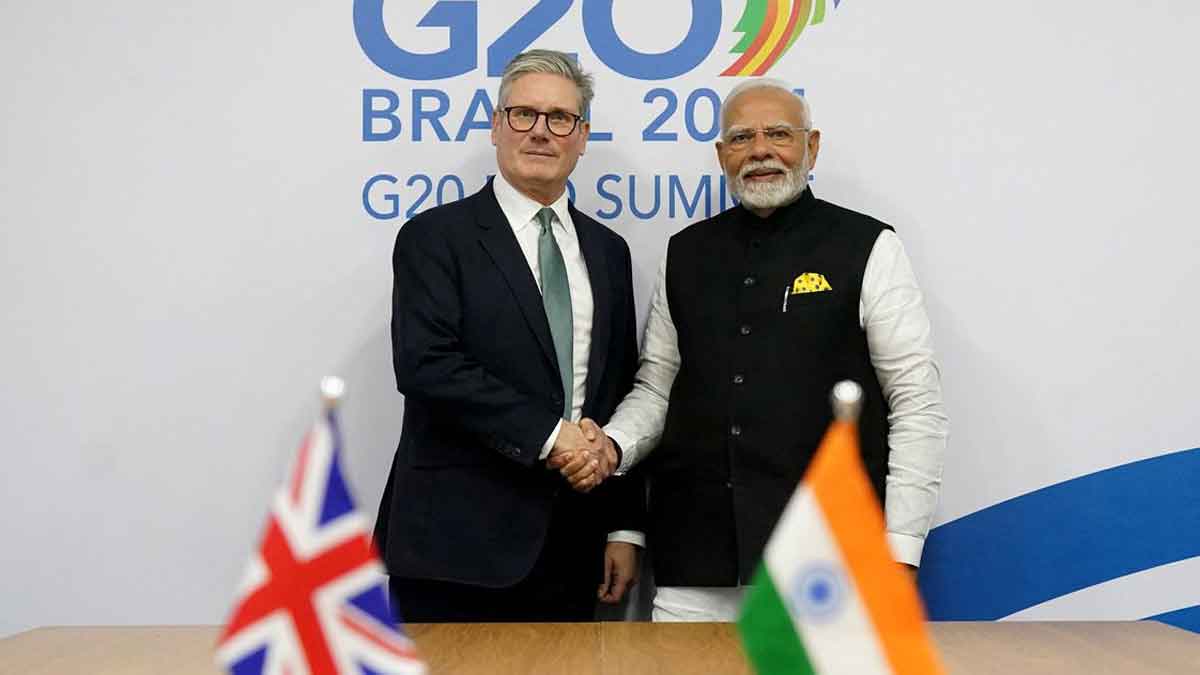'Historic' India-UK free trade deal inked: Key gains for both sides
 UK Prime Minister Keir Starmer along with Indian PM Narendra Modi | X
UK Prime Minister Keir Starmer along with Indian PM Narendra Modi | X
India and the United Kingdom on Tuesday successfully sealed a landmark free trade deal with Prime Minister Narendra Modi hailing it as a "historic milestone". The FTA will catalyse trade, investment, growth and job creation in both economies, he said.
After a phone conversation with his British counterpart Keir Starmer, the UK has officially announced that the trade deal is the biggest the UK has done since leaving the EU.
The trade deal marks the conclusion of a "balanced, equitable and ambitious" FTA, covering trade in goods and services, which is expected to significantly enhance bilateral trade, generate new avenues for employment, raise living standards, and improve the overall well-being of citizens in both countries, an Indian readout said.
The deal was finalised three years after Modi and former UK PM Boris Johnson set a target of concluding the FTA by October 2022. Since then the negotiations have been affected by a wide range of issues including political issues in the UK and tariffs.
"Both agreed that the landmark agreements between the two big and open market economies of the world will open new opportunities for businesses, strengthen economic linkages, and deepen people-to-people ties," the readout said.
Meanwhile, Starmer said strengthening alliances and reducing trade barriers with economies around the world is part of the plan for change to deliver a stronger and more secure economy.
"In a huge economic win for the UK, delivering for working people and British businesses, the Prime Minister underscored the need to go further and faster to get things done, to secure and renew our country," it said.
The breakthrough in the trade negotiations followed back-to-back visits to the UK last week by Commerce Minister Piyush Goyal in order to seal the deal.
What’s in store for both the countries?
The FTA agreement is expected to boost bilateral trade between the world's fifth and sixth-largest economies by 25.5 billion pounds ($34.13 billion) a year from 2040, Britain said.
In 2024, the trade between the two nations totalled 42.6 billion pounds. India was Britain's 11th largest trading partner.
Tariff cuts for UK exporters
India will slash levies on 90 per cent of UK products sold in the country, from alcohol and machinery to medical devices.
Whisky and gin tariffs will be halved from 150% to 75%, before falling to 40% by the tenth year of the deal, benefiting Britain's Scotch whisky industry, reported Reuters.
India will also cut automotive tariffs to 10% from over 100% currently.
Cosmetics, aerospace, soft drinks, chocolates and biscuits are the other UK goods that will face lower tariffs.
Tariff cuts for Indian exporters
The UK has agreed to reduce its own tariffs on some products, which were relatively lower than India's, leaving 99% of Indian exports to Britain facing zero duties.
Britain will remove a tariff on textile imports from India, benefitting India's large apparel industry, which employs millions of workers.
The deal will open up export opportunities for Indian sectors such as marine products, leather, sports goods, toys, gems and jewellery, engineering goods and auto parts, India said.
Double contribution convention
The double contribution convention will exempt temporary Indian workers in UK and their employers from making social security contributions in Britain for three years.
Business